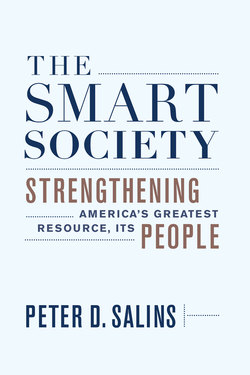The Smart Society

Реклама. ООО «ЛитРес», ИНН: 7719571260.
Оглавление
Peter D. Salins. The Smart Society
Отрывок из книги
Dedicated to my greatest resource, my family:
Rochelle and Jonathan Salins, and Jessica, Mike, and Marissa Malloy.
.....
For America’s human-capital leadership in the workplace to continue, the pace of technological innovation—grounded in scientific discoveries—must accelerate and its businesses must find it profitable to apply new technology rapidly in commercial applications. In his book The Great Stagnation, Tyler Cowen notes the centrality of American-led technological innovation in fueling the economic ascendancy of the United States over the last century and a half—and also suggests (hence the book’s title) that U.S. technological progress since the 1970s has slowed so much that it has led to most of the country’s current economic woes.8 While Cowen may be too pessimistic about U.S. prospects, and also mistaken in believing that we have already maximized potential gains from education and other aspects of human capital (like immigration), he is surely correct in asserting that unless the U.S. technological enterprise is in high gear there can be only limited progress in further workplace productivity—and concomitant rising American incomes.
Unquestionably, high-technology workplaces result from the decisions of far-sighted entrepreneurs. But most entrepreneurs are not inventors, or necessarily even tech savvy (there are very few contemporary Thomas Edisons or Henry Fords). They rely, instead, on the emergence of new technologies arising from research in the nation’s laboratories operated by universities, corporations, and branches of the federal government. Universities are the most dynamic generators of new research and have been since at least the nineteenth century. While universities divert some revenue from their main line of business, teaching undergraduates, to finance faculty scholarship, academic research funding depends heavily on government grants, primarily federal ones. Corporations focused on new product development, like those in the pharmaceutical and computer industries, have a strong incentive to invest in laboratory research but they also count on government support, through both grants and favorable corporate tax treatment. The federal government engages in research more directly through its national laboratories (such as Brookhaven National Laboratory, affiliated with my university), which are overseen by the Department of Energy, the Defense Department, and other federal agencies.
.....